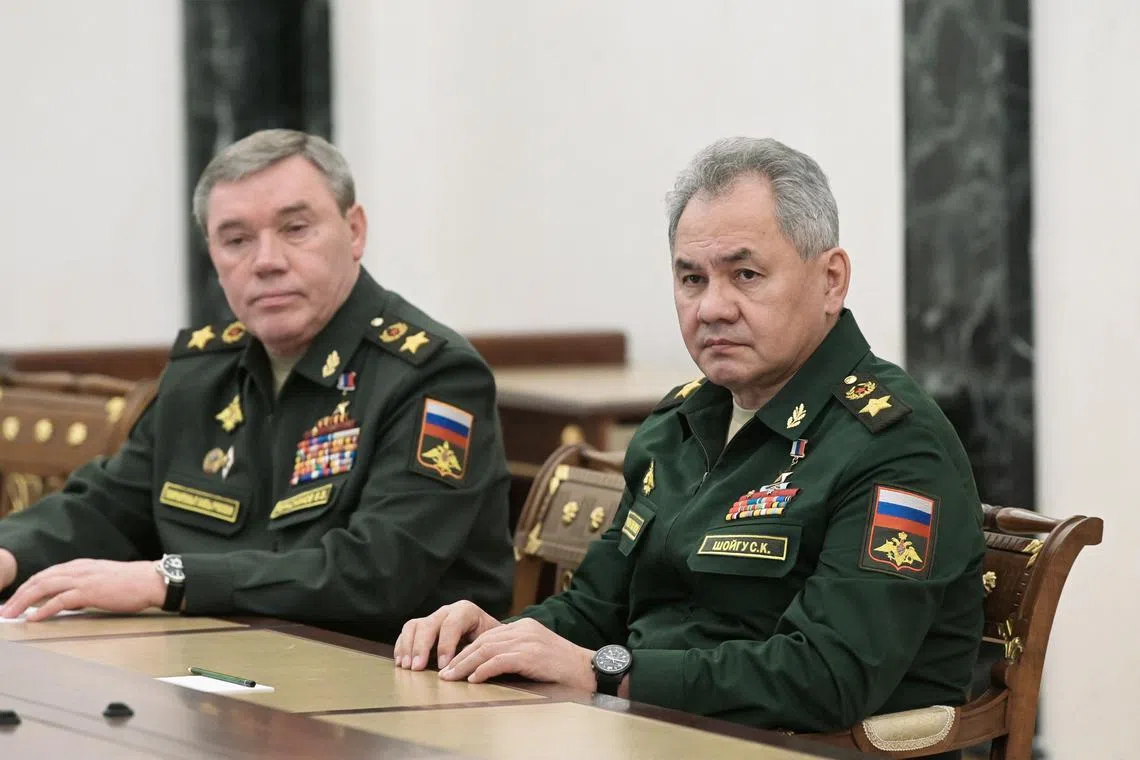ICC issues arrest warrants for Russia army chief, ex-defence minister
Sign up now: Get ST's newsletters delivered to your inbox

General Valery Gerasimov (left) and former Russian defence minister Sergei Shoigu face arrest if they travel to an ICC member state.
PHOTO: REUTERS
Follow topic:
THE HAGUE – The International Criminal Court (ICC) on June 25 said it had issued arrest warrants for Russia’s top army chief and former defence minister over strikes on Ukrainian infrastructure that constituted alleged war crimes.
The ICC warrants are the latest in a series of actions by the court over the Ukraine war, including an arrest warrant for Russian President Vladimir Putin.
The warrants, issued on June 24 but made public on June 25, concerned the Chief of the General Staff Valery Gerasimov and former defence minister Sergei Shoigu.
The pair is accused of the war crimes of directing attacks at civilian targets
ICC judges said there were “reasonable grounds to believe that the two suspects bear responsibility for missile strikes carried out by the Russian armed forces against the Ukrainian electric infrastructure from at least Oct 10, 2022, until at least March 9, 2023”.
The court said these strikes were “directed against civilian objects” and even when targets could be considered military, civilian damage “would have been clearly excessive to the anticipated military advantage”.
Ukraine hailed the “important” decision, with President Volodymyr Zelensky saying Kyiv hoped to see the pair “behind bars”.
“This decision is a clear indication that justice for Russian crimes against Ukrainians is inevitable,” Mr Zelensky said on social media.
Russia dismissed the warrants as “insignificant”.
The country’s security council said: “It’s all hot air since the ICC’s jurisdiction does not cover Russia” and the decision was taken “as part of the West’s hybrid war against our country”.
The ICC, based in The Hague, does not have its own police force to enforce arrest warrants. It relies on the justice systems of its 124 members to carry them out.
In theory, anyone under a warrant is prevented from travelling to an ICC member state for fear of arrest.
Mr Putin himself has travelled abroad, notably to Kyrgyzstan, Saudi Arabia and the United Arab Emirates – none of whom are ICC members.
But he did skip a meeting of the Brics (Brazil, Russia, India, China and South Africa) group in South Africa, which would have been expected to carry out the warrant.
‘Historic first’
Moscow lashed out at the warrant against the Russian leader, calling it “void” and issuing its own warrant against the ICC’s president in response.
Mr Putin replaced Mr Shoigu as defence minister in May in a major shake-up to Russia’s military leadership more than two years into its Ukraine offensive.
The 68-year-old was appointed Russian defence minister in 2012 and has had a decades-long political career of unmatched longevity in post-Soviet Russia.
He was named the new secretary of the Security Council, replacing his longstanding ally Nikolai Patrushev.
The Kremlin said there were no plans to replace General Gerasimov as chief of the general staff.
Along with Mr Shoigu, Gen Gerasimov had been targeted by a hardcore group of influential pro-offensive military bloggers for Moscow’s perceived battlefield failures.
Observers believe Gen Gerasimov was closely involved in devising the plan to send troops to Ukraine in conditions of absolute secrecy.
After taking over in 2012, Gen Gerasimov has been the longest-serving chief of the general staff of the post-Soviet era.
The ICC, created in 2002 to investigate war crimes around the world, in September opened a field office in Kyiv as part of efforts to hold Russian forces accountable for potential war crimes.
That move came after an international office to probe Russia for the war crime of aggression opened in The Hague in March 2023 in what Kyiv called a “historic” first step towards a tribunal for Moscow’s leadership.
Along with Mr Putin, the ICC has also issued a warrant against Ms Maria Lvova-Belova, Russia’s presidential commissioner for children’s rights, on similar charges of unlawful child deportations during the Ukraine war.
In March, the ICC issued warrants for two senior Russian officers, Mr Sergei Ivanovich Kobylash and Mr Viktor Nikolayevich Sokolov, over strikes on infrastructure in Ukraine. AFP

